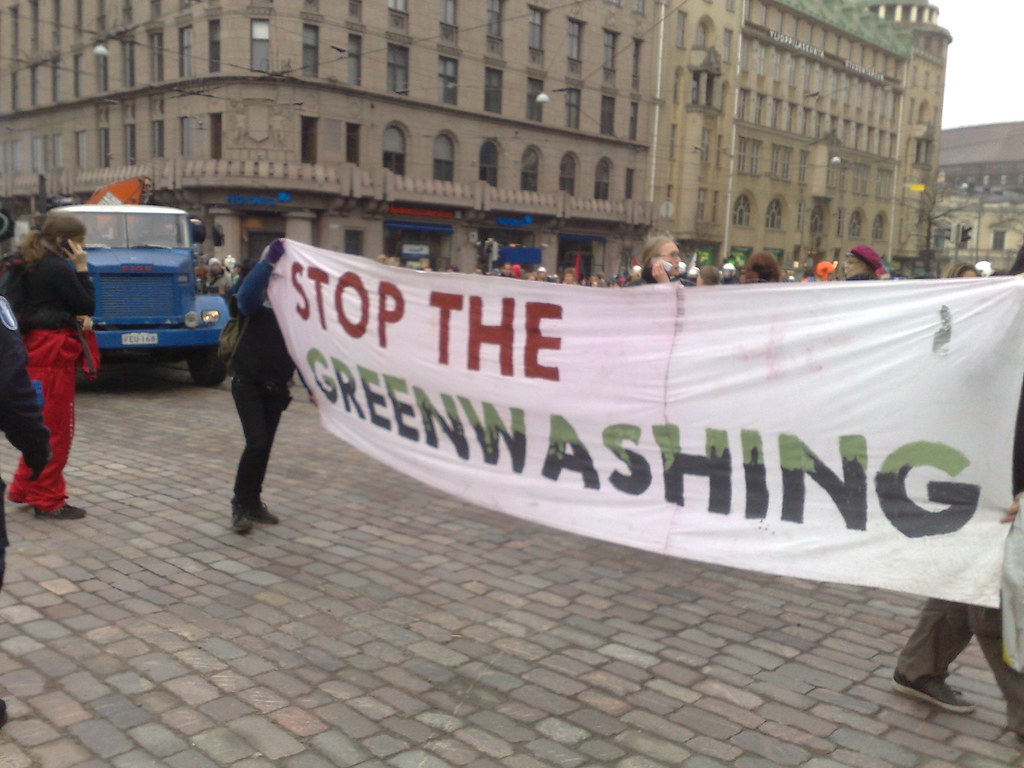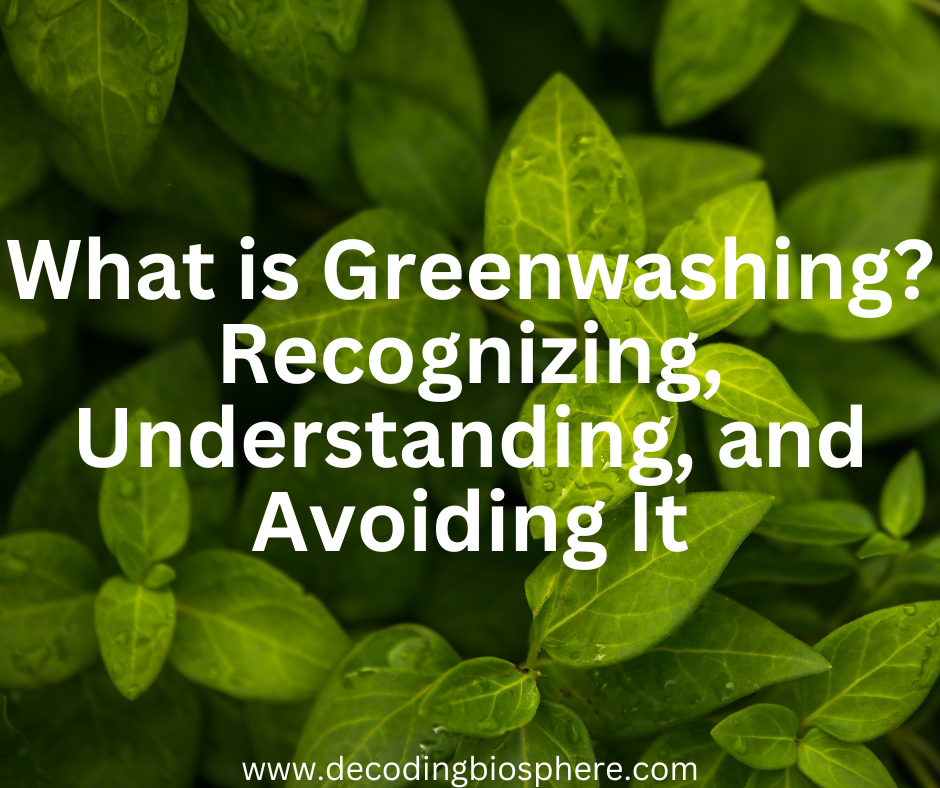In the modern world, many of us strive to make eco-friendly choices, supporting businesses that claim to be environmentally conscious. However, not all companies walk the talk, and some engage in a practice known as greenwashing. Greenwashing is when a company portrays itself as more environmentally friendly than it actually is, often to attract environmentally conscious consumers. This deceptive marketing tactic can mislead consumers and undermine genuine efforts to promote sustainability.
What is Greenwashing?
Greenwashing is like putting on a green cloak to hide a less-than-green reality. Companies use various strategies to create a facade of environmental responsibility, such as misleading labels, incomplete information, or exaggerated claims about their eco-friendly initiatives. The goal is to appeal to consumers who prioritize sustainability without actually making substantial efforts to reduce their environmental impact.
Examples of Greenwashing
- Misleading Labels: Some products carry labels like “green,” “natural,” or “eco-friendly” without any clear evidence supporting such claims. For instance, a cleaning product may advertise itself as “green” due to a single environmentally friendly ingredient while neglecting the harmful chemicals in the rest of its composition.
- Incomplete Information: Companies may boast about one aspect of their business that is environmentally friendly while conveniently omitting less flattering details. An example is a fast-food chain claiming to use sustainably sourced packaging while ignoring its excessive contribution to single-use plastic waste.
- Exaggerated Claims: Some businesses make grandiose statements about their commitment to the environment without providing concrete evidence. An automaker, for instance, might market a new car model as “green” because it has a slightly higher fuel efficiency, while overlooking its overall carbon footprint.
- Green Labels Without Certification: A clothing brand labels its products as “organic” or “sustainable” without obtaining any third-party certifications, leading consumers to believe the products meet certain environmental standards when they may not.
- Biodegradable Plastics: A food packaging company markets its plastic containers as “biodegradable,” but in reality, the conditions required for proper biodegradation are rarely met in traditional landfill environments.
Some Real Life Incidences of Greenwashing
Here are some real-life examples of companies accused of greenwashing. It’s essential to note that these examples may involve allegations or controversies, and not all claims have been proven. Here are a few instances:
- Volkswagen (VW) Emissions Scandal (2015):
- Volkswagen, a prominent German automaker, faced a major scandal when it was revealed that they had manipulated emissions tests for their diesel vehicles. The company had installed software that cheated on emissions tests, giving false readings of lower emissions. This incident contradicted VW’s previous claims of producing “clean diesel” cars.
- British Airways’ Carbon Offsetting Claims (2020):
- British Airways faced criticism for promoting its carbon offsetting program while continuing to operate flights with significant carbon emissions. The airline claimed to be carbon-neutral for domestic flights, but environmental advocates argued that relying solely on offsetting didn’t address the core issue of reducing emissions from the airline’s operations.
- Nestlé’s Water Bottling Controversy:
- Nestlé, a multinational food and beverage company, has faced criticism for its water bottling practices. Despite marketing certain brands as environmentally responsible, Nestlé has been accused of extracting water from drought-prone areas and contributing to plastic pollution. Critics argue that Nestlé’s claims of sustainability are inconsistent with its actual impact on local ecosystems.
- H&M’s Conscious Collection (2019):
- H&M, a popular fast-fashion retailer, introduced its “Conscious Collection,” claiming to use sustainable and eco-friendly materials. However, the company faced accusations of greenwashing as it continued to produce and market a large volume of fast-fashion items, contributing to the industry’s overall environmental impact.
- ExxonMobil’s “Green” Advertising Campaign (2000s):
- ExxonMobil, one of the largest oil and gas companies, launched an advertising campaign highlighting its commitment to environmental responsibility. However, critics argued that the company’s core activities, such as fossil fuel extraction and lobbying against climate regulations, contradicted its green image.
The Consequences of Greenwashing
Greenwashing not only misleads consumers but also undermines the credibility of genuine eco-friendly initiatives. It perpetuates a sense of mistrust, making it challenging for consumers to identify and support businesses that genuinely prioritize sustainability. Moreover, it allows companies to continue harmful practices unchecked, hindering progress towards a more environmentally conscious global community.

How to Avoid Greenwash
- Research: Take the time to research and verify a company’s environmental claims. Look for certifications from reputable organizations that endorse sustainable practices, such as the Forest Stewardship Council (FSC) for responsible forestry or ENERGY STAR for energy-efficient products.
- Check for Transparency: Companies genuinely committed to sustainability are transparent about their practices. If a company provides detailed information about its environmental initiatives, including goals, progress, and challenges, it’s more likely to be authentic.
- Look Beyond Buzzwords: Be cautious of vague and generic terms like “green” or “eco-friendly.” Genuine environmentally conscious companies will use specific language and provide concrete examples of their sustainable practices.
- Compare Competitors: Compare the environmental claims of similar products or services from different companies. If one seems too good to be true, it probably is. Genuine eco-friendly efforts are usually consistent with industry standards.
“Every time you spend money, you’re casting a vote for the kind of world you want.”
By Anna Lappé
Goodreads
Conclusion
Recognizing and avoiding greenwashing is essential for consumers who wish to support genuine sustainability efforts. By staying informed, demanding transparency, and making conscious choices, consumers can encourage businesses to prioritize real environmental responsibility. In the words of Rachel Carson, “The more clearly we can focus our attention on the wonders and realities of the universe about us, the less taste we shall have for destruction.” Let’s choose wisely and contribute to a greener, more sustainable future.
You May Also Like

